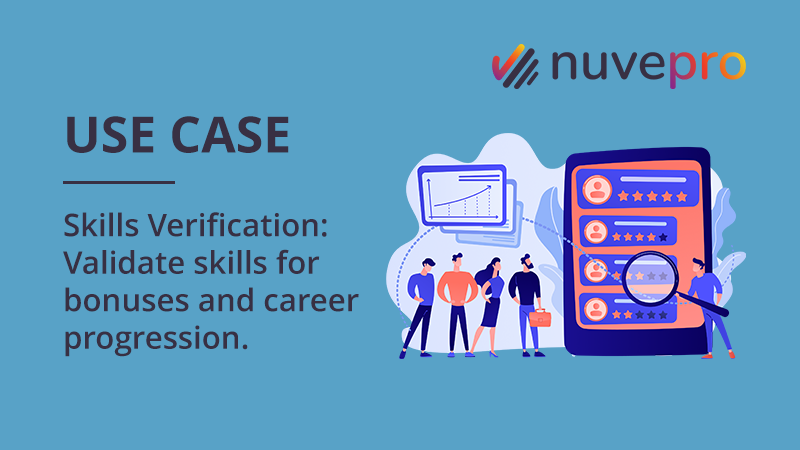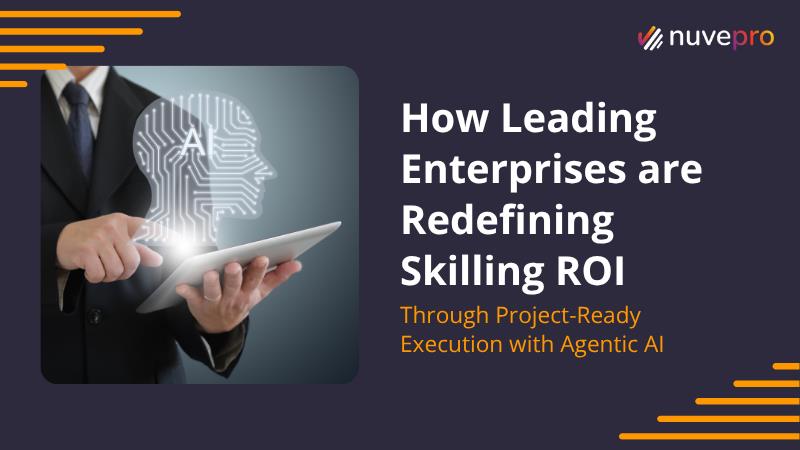Why Validating Skills is Critical in Today’s Workplace
As the IT-enabled services (ITES) industry continues to evolve at a breakneck pace, organizations face a pressing question: how do we ensure our employees possess the right skills for their roles—and reward them fairly for it?
More companies are linking upskilling to performance incentives such as bonuses, project readiness, and career progression. This shift encourages continuous learning, aligns individual goals with business outcomes, and fosters a more engaged, high-performing workforce. However, the ability to accurately validate skills remains a significant challenge.
Without a robust skills verification mechanism, organizations risk making critical decisions based on outdated, inconsistent, or irrelevant measures of capability.
The Challenge: Why Traditional Skill Validation Fails
Despite investing heavily in learning and development, many organizations struggle with verifying skills in a way that is fair, scalable, and aligned with real-world performance. The key challenges include:
1. Inconsistent Validation Method – Traditional approaches—such as academic degrees, generic certifications, and self-assessments—do not reliably measure hands-on abilities. These methods often lack relevance to the project-readiness and real job tasks employees are expected to perform.
2. Lack of Transparent Pathways – Employees are often unaware of how upskilling translates into tangible benefits. Motivation to pursue learning initiatives remains low without clear, skill-based pathways to promotions and bonuses.
3. High Resource and Time Investment – Developing in-house assessment systems that reflect real job tasks requires significant time, effort, and specialized resources. This takes attention away from core business operations and can be difficult to maintain or scale.
4. Rapid Skill Evolution– The fast-paced nature of technology and business means that the skills required today might be obsolete tomorrow. Keeping assessments aligned with evolving job readiness expectations is a continuous challenge.
The Solution: Real-World Skill Verification with Nuvepro
To address these challenges, organizations need a system that can verify skills in a practical, data-driven, and scalable manner. This is where Nuvepro’s Challenge Labs come in—a comprehensive platform that delivers hands-on assessments designed to validate real-world proficiency.
Key Features of Nuvepro’s subjective assessments
1. Real-World Assessments
Unlike traditional tests, Nuvepro’s challenge labs simulate actual workplace scenarios. Employees are asked to complete tasks that mirror their day-to-day responsibilities, providing a realistic gauge of their practical knowledge and job-readiness.
2. Customizable Challenge Labs
Organizations can tailor the labs to match their unique roles, technical requirements, and career progression criteria. This ensures skill validation is closely aligned with business objectives and team goals.
3. Seamless System Integration
Nuvepro integrates easily with existing Learning Management Systems (LMS) and Human Resource Information Systems (HRIS), creating a streamlined experience for both employees and administrators.
4. Scalable, Automated Assessments
Whether you are evaluating ten employees or ten thousand, Nuvepro’s platform supports scalable skill assessments. Automated workflows allow for faster validation without compromising assessment quality.
How Nuvepro’s Skill Validation Supports Career Progression
| Feature | What It Does | Career Progression Impact |
| Role-Based Challenge Labs | Assessments tailored to specific job roles and responsibilities. | Ensures promotions and career moves are based on readiness for the actual role. |
| Real-World Task Simulation | Hands-on labs simulate day-to-day work scenarios. | Demonstrates real job capability—not just theory—giving managers confidence to promote. |
| Customizable Growth Paths | Aligns skills with defined promotion criteria. | Employees can track exactly which skills lead to their next career milestone. |
| Instant Feedback & Reporting | Delivers performance insights to employees and managers. | Enables quick decision-making for role upgrades, lateral shifts, or special projects. |
| Integrated with LMS & HR Systems | Works within the current upskilling and appraisal workflows. | Makes skills validation a core part of existing career development processes. |
| Scalable for All Career Levels | From junior staff to leadership, labs can be adapted. | Supports long-term growth within the company across functions and levels. |
| Automated Assessments | Reduces manual tracking and HR intervention. | Speeds up internal hiring or promotion cycles with validated, instant results. |
| Data-Driven Insights | Identifies team-level skill gaps and top performers. | Helps in succession planning, leadership pipeline building, and focused L&D initiatives |
| Transparent Skill Mapping | Visual roadmap of what skills unlock what opportunities. | Employees feel empowered to take charge of their own growth journey. |
| Performance-Linked Bonuses | Validated skills tied directly to incentives. | Boosts morale and retention by fairly rewarding performance and potential. |
Why This Matters for Career Progression
Nuvepro’s subjective assessments and job readiness model connect learning outcomes with tangible career milestones. Employees are more likely to upskill when they see the results reflected in real opportunities.
- Long-Form Skill Validation: Assessments are designed to be task-oriented and reflective of real-world performance. This results in reliable data that can inform bonus allocations, promotions, and hiring decisions.
- Enhanced Employee Motivation: When skill development is transparently linked to career growth and financial rewards, employees are more likely to take ownership of their learning journeys and invest time in upskilling.
- Reduced Time-to-Verification: Automated, lab-based assessments eliminate delays in evaluating capabilities. This means faster recognition of talent, reduced administrative burden, and more agile talent management.
- Better On-the-Job Performance: By encouraging practical skill development through hands-on training, employees are better equipped to apply their knowledge directly in their roles—leading to improved individual and team performance.
- Data-Driven Talent Insights: Detailed reporting allows managers to identify skill gaps, monitor learning outcomes, and plan targeted upskilling initiatives across teams and departments.
Conclusion: Making Skills Count in the Modern Workplace
Skill acquisition is only as valuable as the ability to validate and apply it. In a world where bonuses and career growth are increasingly tied to employee competencies, organizations need more than a checkbox approach to learning. They need evidence-based, real-world skill verification systems that drive meaningful outcomes.
Nuvepro’s subjective assessments offer a strategic, scalable, and practical solution to this challenge. By enabling organizations to measure what truly matters—performance in real-world scenarios—Nuvepro ensures that career progression and rewards are based on capability, not just credentials.
The future of work demands continuous learning. But more importantly, it demands validated learning.




